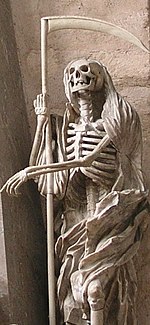
The Young Man Meets Death, a 15th-century Dutch print.
"The Pardoner's Tale" (written in the original Middle English as "The Pardoners Tale" without an apostrophe) is a short story in verse from The Canterbury Tales by Geoffrey Chaucer. The tale takes the form of a religious fable which warns of the dangers of sin. The plot concerns three wicked young men who want to avenge the death of their friend by killing Death himself. However, instead of finding Death in person, they discover a large quantity of gold. The sin of greed causes all three young men to die shortly after they find the treasure.
The pilgrim who is supposed to be telling the tale, the Pardoner, is a kind of religious charlatan who travels around the country to preach and to display what he claims are holy relics. He claims that people who pay him to get closer to the relics will have all their sins forgiven. He always preaches that greed is the root of all evil, to encourage people to pay him for his services. The Pardoner says that his tale, which warns of the dangers of greed, is one of the stories which he tells during his sermons.The Pardoner readily admits to the other pilgrims that he is guilty of the sin of greed himself, that his relics are fake and that he takes no real interest in other people's immortal souls.
Plot

Statue of Death in the Cathedral of Trier, Germany.
The story takes place in Flanders[1] many years ago. There are three young men who spend all of their time in brothels and bars, eat and drink too much, enjoy gambling and swear constantly. One day, while they are at an inn, they see a funeral procession. They ask a boy whose funeral they are watching. The boy tells them that the dead man was one of their friends and that his life, like the lives of so many other people in the area, was taken by Death. The innkeeper says that Death must live nearby because he has killed so many local people. Wanting to avenge their friend, the three young men decide to find Death and kill him.
On their way, they come across an extremely old man and make fun of him, asking him why he is so old. The old man replies that he has no choice but to be old because he has never found any people who would exchange their youth for his old age. He adds that he has asked his mother, the Earth, to let his bones rest beneath the ground but she has not let allowed it and that Death refuses to take him. Hearing this, one of the young men assumes that the old man must work for Death and asks where they can find him. The old man replies that the young men will find Death beneath a tree.

One of the young men returns with poisoned wine for his companions. 1882 illustration by Mary Eliza Haweis from Chaucer for Children.
Arriving at the tree, the young men find several bags full of gold coins. They forget all about looking for Death and turn their attentions to what to do with the money. They decide that they cannot carry it back to their homes in daylight because they will be accused of being thieves and agree to wait until it is dark. One of the young men is sent back to town to buy bread and wine while the other two watch over the treasure.
While the third young man is away, the other two decide to kill him upon his return, so that they will only have to divide the treasure by two and not by three. The young man who has gone to town decides that he can keep all of the gold for himself. He buys some deadly poison and adds it to two of the three bottles of wine. When he returns, he is quickly stabbed to death. His two killers then drink the poisoned wine. Thus, as a result of their greed, Death claims all three men.
The Pardoner ends his story by reminding his listeners why he tells this tale of the dangers of the sin of greed. It is in order to cheat the gullible out of their money in exchange for the false promise of the forgiveness of their sins. However, the Pardoner then adds that he really can guarantee that all people's sins will be forgiven and that he would be happy to provide that service to the other pilgrims, at a price.
See also
Footnotes
- ↑ The area historically known as Flanders makes up most of modern day Belgium and part of northern France.
